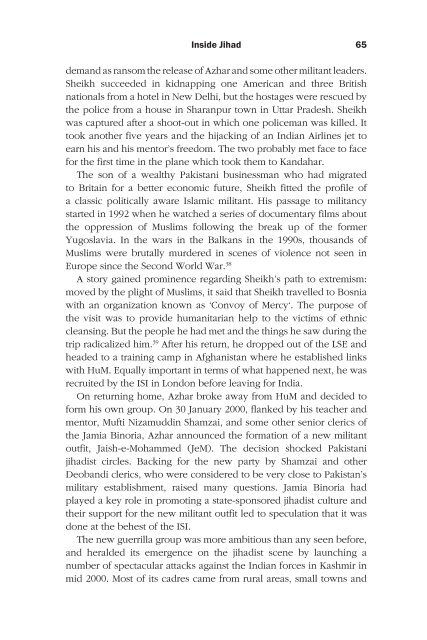Frontline Pakistan : The Struggle With Militant Islam - Arz-e-Pak
Frontline Pakistan : The Struggle With Militant Islam - Arz-e-Pak
Frontline Pakistan : The Struggle With Militant Islam - Arz-e-Pak
Create successful ePaper yourself
Turn your PDF publications into a flip-book with our unique Google optimized e-Paper software.
Inside Jihad<br />
demand as ransom the release of Azhar and some other militant leaders.<br />
Sheikh succeeded in kidnapping one American and three British<br />
nationals from a hotel in New Delhi, but the hostages were rescued by<br />
the police from a house in Sharanpur town in Uttar Pradesh. Sheikh<br />
was captured after a shoot-out in which one policeman was killed. It<br />
took another five years and the hijacking of an Indian Airlines jet to<br />
earn his and his mentor’s freedom. <strong>The</strong> two probably met face to face<br />
for the first time in the plane which took them to Kandahar.<br />
<strong>The</strong> son of a wealthy <strong><strong>Pak</strong>istan</strong>i businessman who had migrated<br />
to Britain for a better economic future, Sheikh fitted the profile of<br />
a classic politically aware <strong>Islam</strong>ic militant. His passage to militancy<br />
started in 1992 when he watched a series of documentary films about<br />
the oppression of Muslims following the break up of the former<br />
Yugoslavia. In the wars in the Balkans in the 1990s, thousands of<br />
Muslims were brutally murdered in scenes of violence not seen in<br />
Europe since the Second World War. 38<br />
A story gained prominence regarding Sheikh’s path to extremism:<br />
moved by the plight of Muslims, it said that Sheikh travelled to Bosnia<br />
with an organization known as ‘Convoy of Mercy‘. <strong>The</strong> purpose of<br />
the visit was to provide humanitarian help to the victims of ethnic<br />
cleansing. But the people he had met and the things he saw during the<br />
trip radicalized him. 39 After his return, he dropped out of the LSE and<br />
headed to a training camp in Afghanistan where he established links<br />
with HuM. Equally important in terms of what happened next, he was<br />
recruited by the ISI in London before leaving for India.<br />
On returning home, Azhar broke away from HuM and decided to<br />
form his own group. On 30 January 2000, flanked by his teacher and<br />
mentor, Mufti Nizamuddin Shamzai, and some other senior clerics of<br />
the Jamia Binoria, Azhar announced the formation of a new militant<br />
outfit, Jaish-e-Mohammed (JeM). <strong>The</strong> decision shocked <strong><strong>Pak</strong>istan</strong>i<br />
jihadist circles. Backing for the new party by Shamzai and other<br />
Deobandi clerics, who were considered to be very close to <strong><strong>Pak</strong>istan</strong>’s<br />
military establishment, raised many questions. Jamia Binoria had<br />
played a key role in promoting a state-sponsored jihadist culture and<br />
their support for the new militant outfit led to speculation that it was<br />
done at the behest of the ISI.<br />
<strong>The</strong> new guerrilla group was more ambitious than any seen before,<br />
and heralded its emergence on the jihadist scene by launching a<br />
number of spectacular attacks against the Indian forces in Kashmir in<br />
mid 2000. Most of its cadres came from rural areas, small towns and













